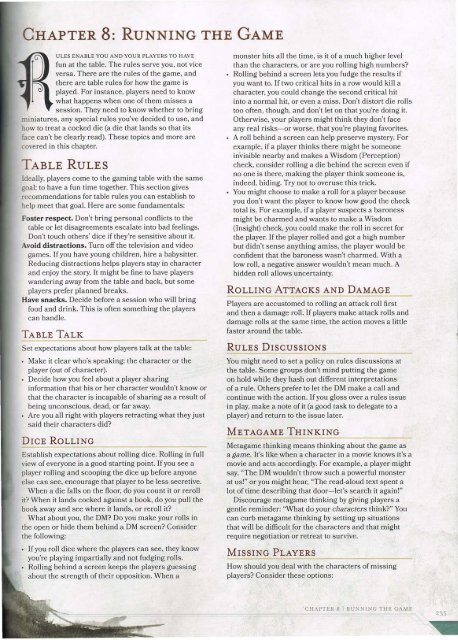Dungeon Master's Guide
You also want an ePaper? Increase the reach of your titles
YUMPU automatically turns print PDFs into web optimized ePapers that Google loves.
CHAPTER 8: RUNNING THE GAME<br />
ULES ENABLE YOU AND YOUR PLAYERS TO HAVE<br />
fun at the table. The rules serve you, not vice<br />
versa. There are the rules of the game, and<br />
there are table rules for how the game is<br />
played. For instance, players need to know<br />
what happens when one of them misses a<br />
session. They need to know whether to bring<br />
miniatures, any special rules you've decided to use, and<br />
how to treat a cocked die (a die that lands so that its<br />
face can't be clearly read). These topics and more are<br />
covered in this chapter.<br />
TABLE RULES<br />
Ideally, players come to the gaming table with the same<br />
goal: to have a fun time together. This section gives<br />
recommendations for table rules you can establish to<br />
help meet that goal. Here are some fundamentals:<br />
Foster respect. Don't bring personal conflicts to the<br />
table or let disagreements escalate into bad feelings.<br />
Don't touch others' dice if they're sensitive about it.<br />
Avoid distractions. Turn off the television and video<br />
games. If you have young children, hire a babysitter.<br />
Reducing distractions helps players stay in character<br />
and enjoy the story. It might be fine to have players<br />
wandering away from the table and back, but some<br />
players prefer planned breaks.<br />
Have snacks. Decide before a session who will bring<br />
food and drink. This is often something the players<br />
can handle.<br />
TABLE TALK<br />
Set expectations about how players talk at the table:<br />
Make it clear who's speaking: the character or the<br />
player (out of character).<br />
Decide how you feel about a player sharing<br />
information that his or her character wouldn't know or<br />
that the character is incapable of sharing as a result of<br />
being unconscious, dead, or far away.<br />
Are you all right with players retracting what they just<br />
said their characters did?<br />
DICE ROLLING<br />
Establish expectations about rolling dice. Rolling in full<br />
view of everyone is a good starting point. If you see a<br />
player rolling and scooping the dice up before anyone<br />
else can see, encourage that player to be less secretive.<br />
When a die falls on the floor, do you count it or reroll<br />
it? When it lands cocked against a book, do you pull the<br />
book away and see where it lands, or re~;oll it?<br />
What about you, the DM? Do you make your rolls in<br />
the open or hide them behind a DM screen? Consider<br />
the following:<br />
If you roll dice where the players can see, they know<br />
you're playing impartially and not fudging rolls.<br />
Rolling behind a screen keeps the players guessing<br />
about the strength of their opposition. When a<br />
monster hits all the time, is it of a much higher level<br />
than the characters, or are you rolling high numbers?<br />
Rolling behind a screen lets you fudge the results if<br />
you want to. If two critical hits in a row would kill a<br />
character, you could change the second critical hit<br />
into a normal hit, or even a miss. Don't distort die rolls<br />
too often, though, and don't let on that you're doing it.<br />
Otherwise, your players might think they don't face<br />
any real risks-or worse, that you're playing favorites.<br />
A roll behind a screen can help preserve mystery. For<br />
example, if a player thinks there might be someone<br />
invisible nearby and makes a Wisdom (Perception)<br />
check, consider rolling a die behind the screen even if<br />
no one is there, making the player think someone is,<br />
indeed, hiding. Try not to overuse this trick.<br />
You might choose to make a roll for a player because<br />
you don't want the player to know how good the check<br />
total is. For example, if a player suspects a baroness<br />
might be charmed and wants to make a Wisdom<br />
(Insight) check, you could make the roll in secret for<br />
the player. If the player rolled and got a high number<br />
but didn't sense anything amiss, the player would be<br />
confident that the baroness wasn't charmed. With a<br />
low roll, a negative answer wouldn't mean much. A<br />
hidden roll allows uncertainty.<br />
ROLLING ATTACKS AND DAMAGE<br />
Players are accustomed to rolling an attack roll first<br />
and then a damage roll. If players make attack rolls and<br />
damage rolls at the same time, the action moves a little<br />
faster around the table.<br />
RULES DISCUSSIONS<br />
You might need to set a policy on rules discussions at<br />
the table. Some groups don't mind putting the game<br />
on hold while they hash out different interpretations<br />
of a rule. Others prefer to let the DM make a call and<br />
continue with the action. If you gloss over a rules issue<br />
in play, make a note of it (a good task to delegate to a<br />
player) and return to the issue later.<br />
METAGAME THINKING<br />
Metagame thinking means thinking about the game as<br />
a game. It's like when a character in a movie knows it's a<br />
movie and acts accordingly. For example, a player might<br />
say, "The DM wouldn't throw such a powerful monster<br />
at us!" or you might hear, "The read-aloud text spent a<br />
lot of time describing that door- let's search it again!"<br />
Discourage metagame thinking by giving players a<br />
gentle reminder: "What do your characters think?" You<br />
can curb metagame thinking by setting up situations<br />
that will be difficult for the characters and that might<br />
require negotiation or retreat to survive.<br />
MISSING PLAYERS<br />
How should you deal with the characters of missing<br />
players? Consider these options:<br />
CHAPTER 8 I RUNN lNG THE GAME




